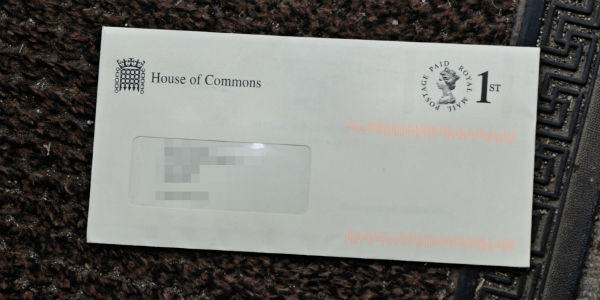Does the online tool WriteToThem foster meaningful communication with constituents?
Some predicted the internet would be the silver bullet that could deal with the deficits of representative democracy. Others were less optimistic about its potential to foster democracy. Hartwig Pautz (University of the West of Scotland) looks at whether the e-democracy tool WriteToThem allows for meaningful communication between citizens and their elected representatives.

Photo: Barry via a CC-BY-NC-SA 2.0 licence
Since its creation, the internet has been hailed by some as an instrument that can ‘fix’ representative democracy, or even make deliberative or direct democracy possible on a mass scale. On the opposite side, some have pondered whether ‘democracy can survive the internet’ in the face of post-truth politics and given the use of the internet to spread lies and ‘alternative facts’.
Amongst the modest claims about the internet’s potential positive impacts on democratic practice is that it can facilitate exchange and communication – in other words, higher levels of interactivity between voters and their elected representatives. Among those believing in the internet as a technology to make democracy better are MySociety – a ‘brand’ of the UK Citizens Online Democracy charity. They have produced tools such as TheyWorkForYou; FixMyStreet; WhatDoTheyKnow; FixMyTransport; PledgeBank; and HearFromYourMP. A further tool is WriteToThem, more or less the internet version of the 1990s FaxYourMP.
WTT allows users to input their postcode and find their representatives – on the local, sub-national, national and EU levels – in order to send them an email. MySociety believe ‘that the internet can meaningfully lower the barriers to taking the first civic or democratic steps in a citizen’s life, and that it can do so at scale’, WTT was set up to facilitate this. This assumption however begs a question: what kind of interactivity does WTT actually facilitate? My research seeks to give answer this question by exploring WTT through research with Members of the Scottish Parliament (MSPs) and Scottish local councillors.
This exploration is approached through how those elected evaluate WTT as a tool that allows citizens to reach out to them. On the positive side, e-survey and interview data show that WTT is well-used, as both MSPs and local councillors demonstrate a keenness on interacting with WTT users. Few, if any, emails go unanswered. But the data also shows that people do not use WTT as planned by its makers. Rather than being used to bring the concerns of individuals to their representative’s attention, WTT is often used by campaigning organisations, albeit indirectly so.
This is done by campaigners who ask their followers to ‘copy and paste’ standardised demand letters into WTT. Replies are not expected, let alone an exchange of views with the MSP or councillor. When asked about this aspect of WTT, one MSP remarked that ‘WTT is ideal for special interest groups trying to generate a pressure of numbers in respect of any issue’. Such usage is unlikely to generate interactivity as WTT becomes little more than a one-way communication tool. Similarly, MSPs and councillors think of many emails through WTT as a call ‘to sort it’.
But the research also showed some positive findings. Some interviewees describe WTT as one of many mechanisms through which to communicate with citizens: ‘I think WriteToThem and things like that are really helpful because it means I have contact, however fleeting, with a wider range of people’, as one local councillor said. Contact, however, does not equal better insight into what is important for constituents. Just over a third of MSPs and only less than a quarter of councillors indicated that they had gained better insight into what concerns citizens through WTT.
It seems therefore that WTT is of limited use for better fulfilling the ‘constituency service role’. Indeed, doing so is further complicated by the competition which WTT messages create when the user decides to send them to all councillors in a multi-member ward or to constituency and list MSP. This can lead to the elected trying ‘to sort it’ all at the same time and thus unnecessarily binding government resources or duplicating officials’ efforts. Yet some respondents regard this competition as healthy for it provides an incentive to react to constituents’ concerns quickly.
What are the conclusions, then? Data presented here shows that only very rarely the instigators of a communication via WTT move communication beyond the initial email and the representative’s response. Instead, many WTT users, despite attempts by MySociety to block such usage, send emails written by campaign organisations. And when email-based iterative exchanges do occur, the representatives do not find them very fruitful.
The research confirms that ‘the internet’ itself cannot stimulate democracy or revitalise the relationship between the represented and the representative. This is not surprising, as technological determinism was always displaced. Nonetheless, WTT is seen by many representatives as a helpful tool for citizens to contact them. What also emerged was that the makers of WTT could have made their tool more attractive to the elected. Some councillors and MSPs voiced unease about the fact that they were never consulted over WTT or their inclusion in its database: ‘I would be in favour of more communication with MySociety.org because I’ve never had communication from them. So, they’re asking me to engage on a site with constituents but they’ve never actually engaged with me to tell me what the purpose of the site is, what they expect of me, how they rate things’, as one MSP said. This is problematic, as e-democracy tools ought to be considered legitimate by all involved. Otherwise, they might contribute to the existing distrust in parliaments and their members.
This post represents the views of the author and not those of Democratic Audit. It first appeared at LSE British Politics & Policy.
 Hartwig Pautz is Lecturer in Social Sciences at the University of the West of Scotland. His research interests lie in the analysis of the role of ideas in policy-making, e-democracy, and right-wing populism. He is also in a leading position in the UWS-Oxfam Partnership.
Hartwig Pautz is Lecturer in Social Sciences at the University of the West of Scotland. His research interests lie in the analysis of the role of ideas in policy-making, e-democracy, and right-wing populism. He is also in a leading position in the UWS-Oxfam Partnership.





 Democratic Audit's core funding is provided by the Joseph Rowntree Charitable Trust. Additional funding is provided by the London School of Economics.
Democratic Audit's core funding is provided by the Joseph Rowntree Charitable Trust. Additional funding is provided by the London School of Economics.
I have a tiny amount of sympathy for MPs who get deluged by campaign emails that are enabled by the rise of the internet and by technology from MySociety websites like WTT.
As an IT professional I do have some understanding of the difficulties MPs face handling hundreds or even thousands of very similar campaign emails, and for sifting out the non-campaign emails from these. That said, when technology creates a mass of campaign emails, it is technology that can provide the solution – if the willingness is there to be democratic and accountable to your constituents and to demand such solutions.
I cannot speak from experience about other constituencies, but I can speak from personal experience of my own MP having sent him various snail-mail letters, individual emails and campaign emails over the years.
Of the individual letters and emails, I have never received a proper response from him. I did receive a letter to one request, but whilst it was addressed to me unfortunately it was an answer to someone else’s request about something entirely different. I also managed to get him to refer a question to the SoS for Local Government, but only after I had chased his office multiple times by telephone. For campaign emails, I have never once had a response from him, even a standard response sent to all similar campaign emails.
I would love to believe that this is a consequence of him being overwhelmed by the volume of campaign emails, but unfortunately all the evidence is that this is simply down to a disdain for his own constituents.
He votes in support of government bills which have a terrible impact on his constituents, and then wrings his hands when the consequences become clear and says that he is doing his best to stop it. My MP is Hugo Swire, Conservative, East Devon and he has stated publicly and explicitly that he simply ignores emails from sites like WTT. His record of speaking in Parliament about his own constituency is simply pitiful – In the 4+ years I have been following him on Hansard, he has spoken only twice in support of his own constituency, and even then somewhat halfheartedly and without a single follow-up. On the other hand, he has spoken about the need to support tourism – but unfortunately about tourism in the Middle East (which he spends rather a lot of time supporting and speaking about in Parliament) rather than tourism in his constituency.
After the last election (which he won) his acceptance speech was used to call some of his constituents “vile and libellous” – gracious in victory he is not. He does not originate from his constituency (having been parachuted into a safe seat), does not have even a second home in his constituency (and has said publicly that he sees himself as a visitor and only when the weather is nice), is apparently reviled by local shop-keepers who have banned him from their shops, and is simply reminiscent of the “rotten boroughs” of history.
(By comparison, his main rival at the last two elections is a local county councillor who fights vigorously every day for local residents on local issues, and who always reads, responds and acts on every email she receives.)
My point, however, is this…
We should not attribute the success or failure of sites like WTT to technology. Since the creation of the postal services, MPs have always been contactable. Whilst technology makes them more accessible – for better or worse – in the end it comes down to whether your individual MP sees himself as a representative of his constituents or simply a Party cog whose job it is to vote with his party whip (apparently without any consideration of the consequences to his constituents or indeed any apparent conscience) in the hope of gaining (or in my own MP’s case, regaining) a ministerial position by keeping his nose clean (or rather brown).